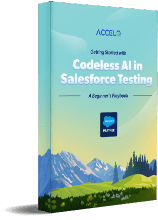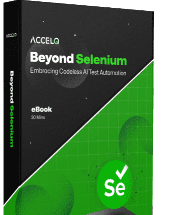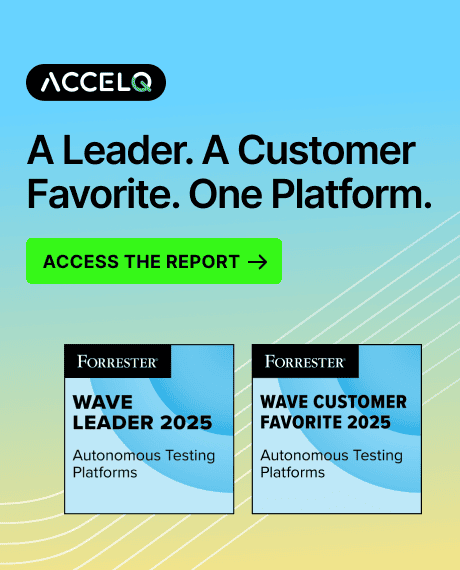Top 10 Salesforce Testing Interview Questions (With Expert Answers)

Salesforce is a core platform powering mission-critical operations across sales, service, marketing, and IT. From customer engagement to revenue forecasting, organizations rely heavily on Salesforce, which makes robust testing a non-negotiable need. That’s where Salesforce test automation steps in as a strategic enabler.
In this Q&A guide, we address top Salesforce testing interview questions that are not just insightful for learners but also critical for professionals preparing for real-world QA challenges.
Whether you’re a Salesforce QA, admin, or business analyst, this post covers the Salesforce interview questions & answers that matter. For a deeper dive into what Salesforce test automation is and why it matters, see our Getting Started with Salesforce Test Automation guide.
- Why is testing Salesforce applications different?
- Why is test automation critical in Salesforce?
- Biggest challenges in automating Salesforce apps
- Tools for Salesforce test automation
- Can Selenium be used for Salesforce testing?
- What should I prioritize in Salesforce automation?
- Handling frequent Salesforce updates
- Best practices for Salesforce automation
- How no-code tools help Salesforce testing
- What to look for in a Salesforce test automation platform?
- Conclusion
1. Why is testing Salesforce applications different from other platforms?
Salesforce’s architecture, especially in Lightning, uses dynamic and component-based UI elements. As a result, testing gets tricky due to:
- No fixed locators (e.g., IDs)
- Shadow DOM handling
- Profile-based UI layouts
- Continuous triannual updates
- Complex integrations with CRMs, ERPs, and third-party tools
These are the factors that render traditional test methodologies inefficient. No-code tools like ACCELQ are designed specifically for your Salesforce CRM QA needs, enabling seamless automation within this vibrant ecosystem.
2. Why is test automation critical in the Salesforce ecosystem?
With Salesforce rolling out new features thrice a year, manual testing can’t keep up with the pace. This leads to:
- Risky releases and delays
- Ineffective coverage
- Tedious regression cycles
Salesforce quality assurance interview questions often revolve around how to maintain test coverage and system reliability despite these changes. Automation tools like ACCELQ mitigate such risks with in-sprint automation and CI/CD alignment.
3. What are the biggest challenges in automating Salesforce applications?
Some of the most asked Salesforce SFDC interview questions focus on automation bottlenecks using Selenium, such as:
- Handling dynamic DOM structures
- Custom business logic validation
- Tab/iframe navigation
- Test maintenance due to frequent UI changes
These make it clear why traditional frameworks fall short and why intelligent no-code platforms are recommended.
4. What types of tools can be used to automate Salesforce testing?
There are two primary categories:
a) Code-based tools (e.g., Selenium):
- Require programming expertise
- Lack native Salesforce support
b) No-code platforms (e.g., ACCELQ):
- Offer visual modeling and abstraction
- Lower maintenance and quick setup
- Excellent fit for Salesforce admin test questions related to usability and scale
For a side-by-side comparison including ACCELQ, check our article on Top 5 Salesforce Automation Testing Tools.
Salesforce Test Automation in Shifting Landscape
A Beginners’ Guide
5. Can Selenium be used for Salesforce automation?
Yes, but it’s limited. Candidates facing Salesforce technical interview questions should be able to explain that Selenium struggles with:
- Shadow DOM components
- Frame navigation
- Frequent locator changes
Instead, no-code tools like ACCELQ address these issues natively, enabling scalable, robust automation.
Want to see how ACCELQ enhances Selenium? Read How to use Selenium Testing with ACCELQ.
6. What should I prioritize in my Salesforce automation strategy?
Key areas to start:
- Regression-heavy modules like leads and opportunities
- Custom workflows
- External system integrations
- Role-based access validation
A good Salesforce testing interview question might ask how to identify these high-priority areas. The answer lies in focusing on high business impact and using test design best practices.
7. How do I handle frequent Salesforce updates with minimal disruption?
Best practices include:
- Align testing cycles with the Salesforce release calendar
- Use metadata-aware automation platforms
- Leverage tools with self-healing capabilities like ACCELQ
This is a top interview question for Salesforce tester roles, as it touches on both testing agility and platform adaptability.
See real-world strategies in Using ACCELQ to handle Salesforce Test Automation challenges.
8. What are some best practices for Salesforce test automation?
- Shift-Left testing
- Metadata-based test creation
- Business-process-first approach
- Decoupling data from logic
Candidates often face Salesforce testing interview questions asking about strategy, and the right answer usually includes automation-first, modular test practices.
Learn how to integrate testing into your Salesforce DevOps pipeline in our post on Optimizing Salesforce CI/CD for High‑Performance Software Delivery.
9. How can no-code platforms help with Salesforce test automation?
No-code tools are particularly useful for:
- Fast adoption by non-technical users
- Rapid regression testing
- Role-based test scenarios
- Abstraction-based maintenance
This ties into Salesforce CRM QA questions about tool usability and ROI. ACCELQ, for example, is known for its intuitive interface and faster implementation cycle.
10. What should I look for in a Salesforce-compatible test automation platform?
Key capabilities:
| Feature | Why It Matters |
|---|---|
| Lightning, Classic & LWC support | Full UI coverage |
| Self-healing locators | Reduces rework |
| No-code authoring | Faster ramp-up |
| Metadata alignment | Test relevance |
| CI/CD readiness | Agile-ready |
| In-sprint test creation | Matches dev pace |
Choosing a tool that supports these ensures scalable and resilient test coverage, often a point raised in Salesforce quality assurance interview questions.
Conclusion
Salesforce Test Automation is about more than scripting tests; it’s a way to ensure business continuity in a fast-paced ecosystem. Whether you are planning an interview for a role or scaling your QA strategy, these Salesforce testing interview questions are essential.
Platforms like ACCELQ provide unparalleled ease, scale, and Salesforce intelligence, enabling successful modern enterprises to pursue high-quality, automated Salesforce releases.
Prashanth Punnam
Sr. Technical Content Writer
With over 8 years of experience transforming complex technical concepts into engaging and accessible content. Skilled in creating high-impact articles, user manuals, whitepapers, and case studies, he builds brand authority and captivates diverse audiences while ensuring technical accuracy and clarity.
You Might Also Like:
 How Salesforce QA Testing is Revolutionizing in 2023?
How Salesforce QA Testing is Revolutionizing in 2023?
How Salesforce QA Testing is Revolutionizing in 2023?
 How to Test Common nCino Use Cases With Test Automation
How to Test Common nCino Use Cases With Test Automation
How to Test Common nCino Use Cases With Test Automation
 Getting ahead with Salesforce CPQ Testing using ACCELQ
Getting ahead with Salesforce CPQ Testing using ACCELQ





































